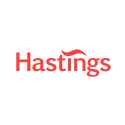How Hastings Group Transitioned to IFRS 17 Accounting Standard With FastPost


Background
Hastings Group, a UK-based consumer insurance provider, commenced its IFRS 17 program in late 2020. Though slightly later to start than a number of its peers, with support from PwC, Hastings was able to accelerate its requirements definition process and execute a rapid market evaluation and vendor selection.
Starting when it did, Hastings could consider software packages that were already developed for IFRS 17, compared with earlier adopters, which were faced with the alternatives of building in house or opting for a solution that was still being developed.
A key requirement was for a non-disruptive solution that delivered IFRS 17 compliance – a minimum viable product, but one that also closely aligned with Hastings’ cloud first strategy and modern data architecture.
By taking this approach, Hastings wanted to preserve the existing management reporting process, with no adverse impact on month end, whilst gaining the additional sub ledger data granularity and business insight required by IFRS 17. The target architecture would also improve end to end integration across all source and target systems. Like most insurance providers, Hastings uses a range of systems and a revised cloud platform is also being implemented as part of a firm wide data ecosystem.
Functionally, the solution needed to support the Group’s insurance undertaking in Gibraltar and provide consolidated Group results under the IFRS 17 standard to its parent company – Sampo plc – in Finland.
FastPost, a third generation SaaS accounting rules cloud platform, was chosen.
Criteria for a Solution
Hastings had an ambitious technical roadmap and needed a vendor that would support its requirements. The Group required a cloud native SaaS solution that provided the flexibility to meet Hastings’ functional needs but also provided the scalability to support its ambitious growth plans.
As well as processing the IFRS 17 actuals, Hastings wanted to use FastPost for calculating forecast information as input to the planning process. FastPost can apply user defined business rules for creating future period balances based on patterns. This can be applied to any balance, but Hastings particularly required forward looking views of amortization of acquisition costs over different renewal periods and recognition of commissions over policy terms.
Delivery
FastPost was deployed and configured within ten months. This enabled Hastings to complete its entire change and test process during 2021 and achieve “go live” in December 2021. Hastings is now significantly ahead of many of its peers with IFRS 17 opening balances implemented and comparatives starting from the beginning of 2022.
Challenges
The project had to adapt to the various moving parts of Hastings’ broader ongoing data transformation program, and across all stakeholders including Finance, Actuarial, and IT.
Digitally focused insurance providers like Hastings stay competitive by constantly updating their product offering. This meant the team needed to add new products during the implementation, including new home offerings and multi-car policies. FastPost’s rules-based configuration allowed for the rapid onboarding of new products.
Data management is one of the major challenges of an IFRS 17 project, however Hastings already had good data controls in place. Unlike many insurance firms, Hastings was operating a modern PAS so had less reliance on multiple legacy systems. The data was already defined so the team was in good shape to focus on the granularity required for IFRS 17 reporting. That said, running a large data ecosystem transformation project in parallel meant that some pragmatic decisions needed to be taken to keep the project on track at times.
Business Benefits
With FastPost, Hastings is building on the existing data ecosystem by providing another step in the integration between Finance and the rest of the business. The ability to deliver accounting validated data for both Finance and the wider business community provides significant benefit to the organization.
Hastings will benefit from FastPost’s accounting rules engine and subledger, which were developed to give finance departments greater control and ownership of their accounting data, and, importantly, the ability for additional steps and analysis for IFRS 17 processing to be completed with no delay to the financial reporting timetable.
With our ambitious growth plans, and commitment to digital leadership through embracing new technology, we found the ideal partner in [FastPost].